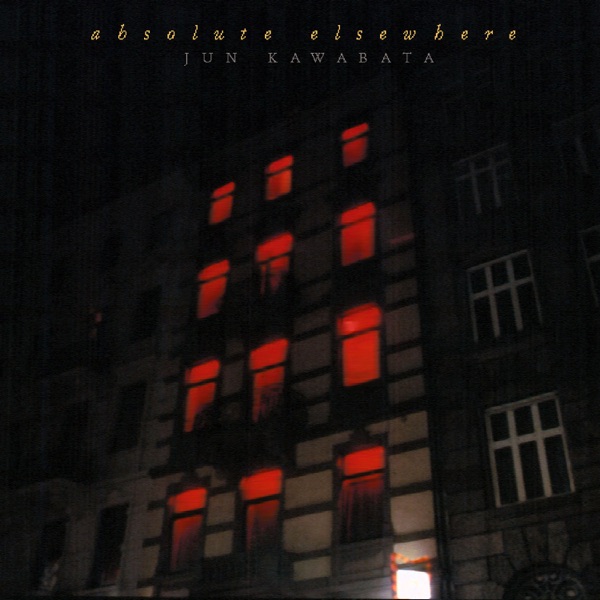As I start to look ahead, toward future travels, today I’m touching back on an album and an idea that I felt has guided me in some way, recently. It’s hard to pinpoint what Jun Kawabata accomplished on his 1997 release, 『Absolute Elsewhere』 but one doesn’t need to put a stake in the ground to take something special away from his work. Inspired by his own travels, influenced by places, people, and atmosphere, it’s a haunting bit of ambient music tied to the ambiance of memory.
You could call Jun Kawabata many things: a photographer, writer, composer or producer. However, in the early ‘80s, this native Tokyoite was in Africa trying to find himself, and for a moment there, trying to live out another day.

As a young man, Jun sought to travel, trying to find himself in a world where he just couldn’t find a place to call home. With just a backpack and a camera, Jun headed out to Africa not knowing where or how long he’d be gone.
Four years in Africa, led to years in Europe. Then, Africa once again came calling. Everywhere Jun would go he’d take and develop photographs, snapshots of his world as a young man endlessly searching. Then while working as an assistant to the great street photographer, Ed Van der Elsken, his search ended. Jun realized that wherever he could be was home.
In the early ‘90s, Jun would root down in Tokyo, pursuing a career as a contemporary composer. As a composer, his background in photography allowed him to work closely with iconic Japanese landscape photographers like Hiroya Mizuguchi, as he would as part of Missing Link, contributing to some of the group’s most impressive environmental music on tracks like “Summer Days”.
That capacity to take still imagery and marry it to sound design and ambient music would open up more opportunities. Soundtrack work for nature documentaries by Michio Hoshino, led Jun to explore the nascent world of multimedia sound design. By the mid ‘90s, Jun started his own record label, the Airplane Label, to house music by other composers like him who didn’t think of themselves as strictly “Japanese” artists.
The closest “universal” analogue I could think of Jun Kawabata’s『Absolute Elsewhere』would be Mr. Hinata’s own atmospheric work. It’s music that uses melodic ideas gleaned from the themes of nostalgia and displacement, as a means to an end. What color is memory, so to speak? I say this because right before Jun recorded this album, he went home again.

In the mid ‘90s out in the streets of Porto, waiting at an airport in Paris, by high-rises of Frankfurt, and inside the homes of Africa, there Jun was taking new photos and collecting field recordings of places he visited at a different time and headspace in life. Armed with this wash of memory, Jun came back to to Tokyo to record something he’d dub “road movie music” for what would came to be『Absolute Elsewhere』.
It’s easy to plot out the arc of Jun’s journey through 『Absolute Elsewhere』. The album begins with a field recording of what sounds like either Charles De Gaulle Airport or Tokyo’s Haneda International and ends back home with the blues, after leaving Rothenburg. The impressionistic ambient jazz of “Mimizan” takes us to where Jun lands right at the western edge of continental France. As evidenced in his photo book, Jun’s preference to capture stills of life outside the more trafficked areas, finds him capturing more intimate and quotidian experiences, and in his music a more expressive, more reflective, sense of sonic atmosphere.

Songs like “Madrid” and “Zurich” become pointillistic sound poems that juxtapose the idea of Old Europe with the modern version that’s far more surprising (and unexpected) to discover. Other tracks like “To Switzerland”, tonally, capture the sometimes meditative and slightly hopeful “joie de vivre” one can’t escape feeling before lifting off. What I enjoy about Jun Kawabata’s 『Absolute Elsewhere』 is how the memories and nostalgia being related to us is done so through equally memorable music.
Jun’s “Paris Night”, remains a haunting ambient groove that doesn’t let you settle between whether it’s romance or heartbreak music. The touching “West End / Portugal”, tries to ruminate on those trying to eke out a living at the edge of the “First World” with a sonic palette that’s perfectly chosen for it. And like all long vacations, that thing looming over us, that of a journey’s end, brings us down to earth. And in this album’s case, a powerful curtain call, in the shape of songs like “German Winter” and the Tom Waits-influenced closer “Go Home”, allow us to reflect once again on how the journey is always more important than the destination.

I mean, in the end, who says you can’t go home again (if that’s absolutely everywhere)? Some of the best “healing music” starts at the end of a deep cup and a look out a window: life’s simple portrait.
Like many others, when young
I can’t help but thinking variety of things.Things like where did I come from and where am I going
A kept traveling seeking for the place where I was not then
Fow almost 20 years. I just continued walking in the abstract
The journey started from Africa then directed to Europe and continued.Africa
Just hearing its sound, my heart beats.The other day, a thought suddenly came up
– Jun Kawabata, from 『Absolute Elsewhere』
There is no place on earth besides the place where you are now.
Maybe, I would go nowhere and could go nowhere
And…the place where I am is the right place for me.
